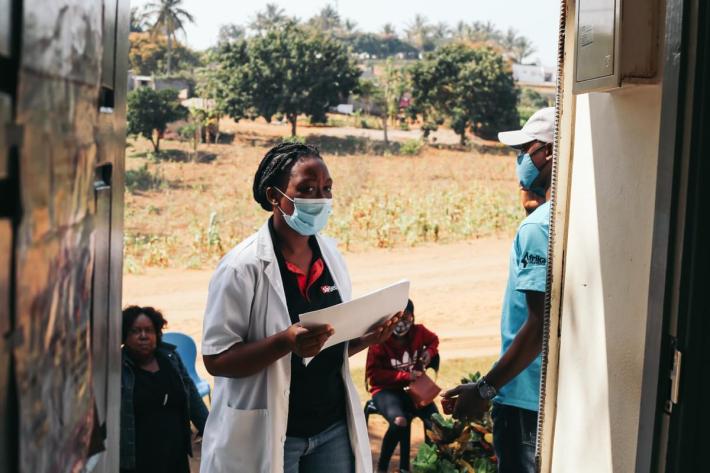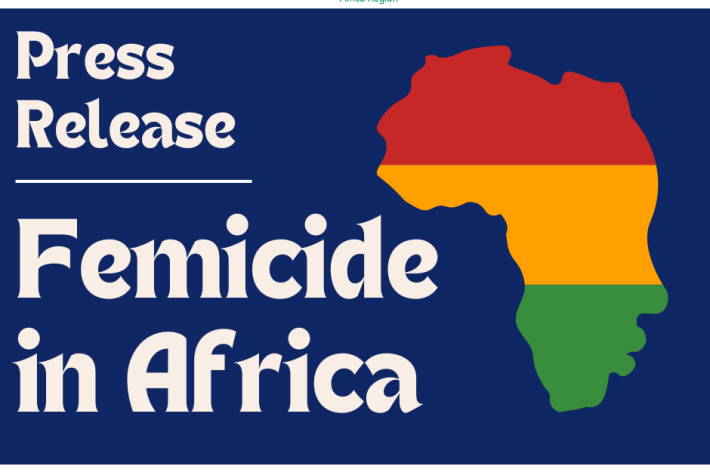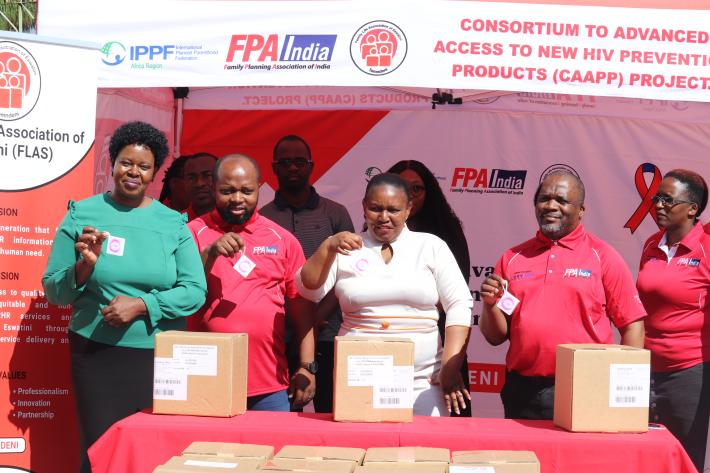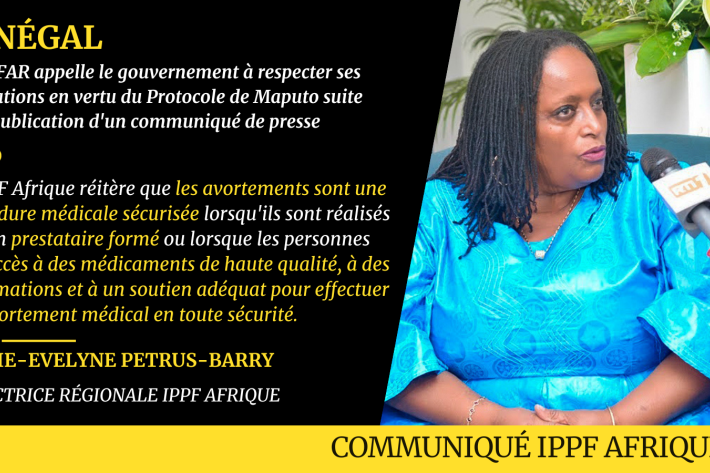Latest press releases
A selection of stories from across the Federation
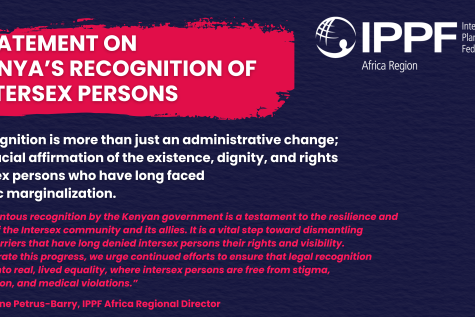
Kenya
IPPF Africa Region Welcomes Kenya’s Landmark Recognition of Intersex Persons
IPPF Africa Region Welcomes Kenya’s Landmark Recognition of Intersex Persons Nairobi, Kenya: 13 February 2025 – On 31 January 2025, Kenya has taken a groundbreaking step towards inclusivity and human rights by officially recognizing intersex as a sex marker alongside male and female in the Kenya Legal Notice 153 of 2025.


| 11 December 2023
Joint Statement from Civil Society on the 75th Anniversary of the UDHR

| 12 October 2023
IPPF Africa Expresses Concern Following instructions from Zambia’s Ministry of Health to Avoid Use of The Term “Sexual and Reproductive Health and Rights”.
Nairobi, Kenya: 12 October 2023 – The International Planned Parenthood Federation Africa Region (IPPFAR) notes with concern an internal memo sent by the Zambian Ministry of Health to all provincial health directors and cooperating partners dated 21 September 2023, which advises against the use of the term “sexual and reproductive health and rights” and to instead refer to “reproductive health and rights” only. The Zambian Ministry of Health’s rationale for the removal of the terms “sexual health and rights” is that “the inclusion of the words “sexual” and “rights” in the same phrase is the inclusion of Lesbian, Gay, Bisexual, Transgender, and Qveer (sic) rights” (MoH Zambia, 2023). This is correct, as “sexual rights are constituted by a set of entitlements related to the sexuality of all persons regardless of their gender, gender identity and/or expression, that emanate from the rights to freedom, equality, privacy, autonomy, integrity and dignity of all people” (IPPF, 2016) – and like all rights, sexual rights are interconnected, indivisible, and applicable to all. “Removing reference to sexual health and rights has real-world implications for people, especially women, and girls, including an entrenchment of patriarchal norms and a framing of people's bodies as useful for reproductive purposes only. This has far-reaching negative implications that are demonstrated by an increase in female genital mutilation and child marriage, and forced treatments, including sterilisation, virginity examinations, and abortions. Removal of sexual rights could also lead to the subjecting of women’s access to sexual health services to external approval, for example from a husband or male relative.”, said Marie-Evelyne Petrus-Barry, IPPF Africa Regional Director. The inclusion of the term “sexual health and rights” protects the rights of women and girls to consent to sexual activity and treatments, and to access information that allows them to make informed decisions about their sexual health. In addition to offering equality for women in freely deciding the spacing of their children, sexual rights also protect the right to bodily autonomy and to make informed decisions about one’s body. Furthermore, sexual health and rights are closely associated with the prevention and treatment of HIV/AIDS. Removal of these terms could negatively affect the provision of services to, and rights of people living positively and needing access to treatment and other forms of support services. Marie-Evelyne Petrus-Barry added that: “IPPF Africa echoes the Guttmacher-Lancet Commission report (2018), sexual health and rights are not just words, behind them are real people; especially women and girls who need to access services that aim to provide a state of complete physical, emotional, mental, and social well-being in relation to sexuality. These services are protected by sexual rights that protect all people’s rights to fulfill and express their sexuality and enjoy sexual health free from coercion.” IPPFAR reiterates that the Government of Zambia is party to several commitments in which sexual and reproductive health and rights are central – including the Protocol to the African Charter on Human and People’s Rights on the Rights of Women in Africa, the African Charter on People’s and Human Rights, and the International Covenant on Economic, Social, and Cultural Rights. Furthermore, as Lusaka will host the AU/UNECA ICPD+30 Africa Region Consultation in November 2023, it is critical to recall that the 1994 International Conference on Population and Development (ICPD) affirmed that Sexual and Reproductive Health and Rights are Human Rights. If we are to achieve these commitments 30 years later, it is critical that Zambia recommits to the attainment of sexual and reproductive health and rights for all. END For further information or to request an interview, please contact: -Mahmoud GARGA, Lead Specialist - Strategic Communication, Media Relations and Digital Campaigning, IPPF Africa Regional Office (IPPFARO) – email: [email protected] / Tel: +254 704 626 920 ABOUT IPPF AFRICA REGION (IPPFAR) The International Planned Parenthood Federation Africa Region (IPPFAR) is one of the leading sexual and reproductive health (SRH) service delivery organization in Africa, and a leading sexual and reproductive health and rights (SRHR) advocacy voice in the region. Headquartered in Nairobi, Kenya, the overarching goal of IPPFAR is to increase access to SRHR services to the most vulnerable youth, men and women in sub-Saharan Africa. Supported by thousands of volunteers, IPPFAR tackles the continent’s growing SRHR challenges through a network of Member Associations (MAs) in 40 countries. We do this by developing our MAs into efficient entities with the capacity to deliver and sustain high quality, youth focused and gender sensitive services. We work with Governments, the African Union, Regional Economic Commissions, the Pan-African Parliament, United Nations bodies among others to expand political and financial commitments to sexual and reproductive health and rights in Africa. Learn more about us on our website. Follow us on Facebook, Twitter, Instagram and You Tube.

| 07 September 2023
IPPFAR Launches 'Common Senses' Campaign to Challenge Sexual Reproductive Health and Rights Stereotypes in Sub-Saharan Africa
Nairobi, Kenya, 10th September 2023 – The International Planned Parenthood Federation African Region (IPPFAR) proudly presents 'Common Senses', a digital campaign for Sub-Saharan African youths, aiming to challenge stereotypes about Sexual Reproductive Health and Rights (SRHR), gender, and people with disabilities, in English, French, and Portuguese. Let’s change the narrative! Difference in all of its forms is not understood and often feared. What if, instead of focusing on differences, we focus on what we have in common? To raise awareness and sensitize adolescents and youth on stereotypes related to SRHR and gender, the campaign will stimulate people to experience empathy in a way they have never been able to before. The movement, grounded in common sense and human values, aims to break common misconceptions, inviting the audience to think, discuss, and debunk these myths. It highlights stereotypes rooted in social constructs like culture, education, dogmas, society, educators, and family values. “At IPPF we believe lasting change comes through understanding one another’s perspectives. #CommonSenses seeks to unite us through our common humanity rather than divide us by our differences,” said IPPF Africa Regional Director Marie-Evelyne Petrus-Barry at the campaign launch. Using the power of empathy and shared human experiences, Common Senses aims to transform topics once seen as taboo into an open, judgement-free conversation. It aims at: Celebrating the common senses that humanise and bond us beyond our differences, through the values of Ubuntu. Changing the narrative around Sexual Orientation, Gender Identity, Expression, and roles by creating and supporting a new narrative towards what is just, honest, and undeniably human. Empowering the audience by informing and educating them on simple terms relatable to women & young girls, persons with disabilities, and LGBTIQ+ Community. Campaign Overview Rooted in the Ubuntu philosophy, this campaign invites African youths to embrace the common senses and fundamental principles that unite us all: freedom, passion, togetherness, and humanity. Take the challenge, challenge your #CommonSenses! We’re all just #UndeniablyHuman. Our "Common Senses" campaign unfolds across six major social media platforms: Facebook, Instagram, Twitter, TikTok, YouTube and Linkedin. Common Senses campaign has been launched since the 1st of September 2023 and will run for 3 months until November 2023. To mark the inception of the campaign, we're excited to unveil a compelling launching video that encapsulates the essence of "Common Senses." This video sets the tone for the transformative journey ahead, inviting all African youths to join hands in reshaping narratives and breaking stereotypes. At the heart of the campaign will be a series of three impactful video series showing the world through the eyes of marginalized groups, including LGBTQI+ and transgender individuals, people with disabilities, and victims of sexual harassment. By evoking empathy, these stories will encourage audiences to reconsider preconceived notions around topics like gender identity, sexual orientation, and women’s rights. IPPF is inviting people across Sub-Saharan Africa and beyond to join Common Senses by opening their eyes, ears and minds. “This is not about pointing fingers or assigning blame. It is about realizing we have more in common than we think. Let’s just approach each other with empathy first,” Marie-Evelyne Petrus-Barry stated. CONTEXT BEHIND THE MAKING OF ‘COMMON SENSES’ Sexual and Reproductive Health and Rights (SRHR) is a human rights concept applied to sexuality and reproduction, encompassing a range of fundamental human rights, such as the right to life, health, privacy, education, and freedom from discrimination. These principles ensure that everyone is entitled to accessible reproductive healthcare, information, and facilities without discrimination. Despite these rights, gender stereotypes often obstruct access to SRHR, especially for women, people with disabilities, and LGBTQ+ individuals ('key populations'). These stereotypes persist in many Sub-Saharan countries, underlining the need for a shift in mindset and youth engagement to reshape narratives regarding SRHR and gender. Figures of Women & Young Girls Facing Stereotypes: Gender inequality and stereotypes deny women access to reproductive healthcare. With 31% of African females aged 20-24 married before 18, addressing adolescent sexual and reproductive health and rights is vital.[1] A 2021 UNFPA study revealed that approximately 49 million sexually active women in East and Southern Africa lack access to modern contraception and family planning services, resulting in adolescent pregnancy rates in the region being twice the global average, at 92 births per 1,000 girls. 37% of ever-partnered women above the age of 15 in low and middle-income countries in the African region had experienced physical and/or sexual violence by an intimate partner in their lifetime.[2] Figures of Persons with Disabilities Facing Stereotypes: Persons with disabilities face a myriad of demand and supply-side barriers to accessing sexual and reproductive health care in Sub-Saharan Africa because of systemic discrimination and denial of their needs. Figures of LGBTIQ+ Community Facing Stereotypes: According to the International Lesbian, Gay, Bisexual, Trans, and Intersex Association (ILGA), 33 of the 54 African states recognised by the UN have laws that criminalise same-sex sexual acts. In most of the 21 other African countries, homosexuality is not criminalised in legislation. However, in some, provisions penalising ‘acts against nature’, ‘indecency’, or ‘debauchery’ are used against LGBTIQ persons. TESTIMONIALS Women & Young Girls “Our church doctrine is that girls must marry when they are between 12- and 16-years-old to make sure they do not sin by having sexual relations outside marriage. As soon as a girl reaches puberty any man in the church can claim her for a wife.”- women, South Sudan, 2015[3]. Persons with Disabilities “Most of the ladies like to tease me and they say, “Come, I want to marry you”. Then they say, “If I marry you, how are you going to satisfy me sex-wise?” I said, “That’s the problem with you people when you look at people with spinal cord injuries, people with physical disabilities, you still have that mindset of saying that they can’t have sex, they can’t do this or they can’t do that. That is your big mistake. We can have sex. We can live a normal life like everyone else. So, that thing must come out of your mind.”— Mandla, February 2021 - South Africa[4] LGBTIQ+ Community “I am a human being before who I have sex with. I could be a doctor giving services at the health care centre, but the media portrays me just as a sex addict.” - Jam Session, 2023. NOTES TO EDITORS: For more information, please visit africa.ippf.org or follow us on @Facebook, @Instagram, and @Twitter. ABOUT IPPFAR The International Planned Parenthood Federation Africa Region (IPPFAR) is one of the leading sexual and reproductive health (SRH) service delivery organization and sexual and reproductive rights advocacy voice in Africa through its Member Associations (MAs) in 40 countries. All people are free to make choices about their sexuality and well-being, in a world without discrimination. To continue the mission of safeguarding universal access to SRHR for all as a fundamental right in Sub-Saharian Africa, there is the need to work strategically on demystifying the harmful stereotypes related to Sexual Reproductive Health and Rights (SRHR) and gender. For enquiries please contact: Moctar MENTA, Media Advisor, IPPF Africa Regional Office (IPPFARO) – email: [email protected] -Phone +254 113 896 555 [1] Global causes of maternal death: a WHO systematic analysis. Lale Say, Doris Chou, Alison Gemmill, Özge Tunçalp, Ann-Beth Moller, Jane Daniels, A Metin Gülmezoglu, Marleen Temmerman, Leontine Alkema. 6, 2014, Lancet Global Health, Vol. 2 [2] World Health Organization. Global and regional estimates of violence against women: prevalence and health effects of intimate partner violence and nonpartner sexual violence. 2013 [3] Human rights watch https://www.hrw.org/news/2015/12/09/ending-child-marriage-afric [4] Physical Disability and Sexuality Stories from South Africa, Palgrave Macmillan Cham, 2021

| 16 August 2023
Japanese MP visits IPPF Member Association in Mozambique
On 16 August 2023, Japanese House of Representatives member Dr Toshiko Abe visited head office and the Adolescent and Youth Friendly Services Centre of IPPF’s Member Association in Mozambique, the Associação Moçambicana para Desenvolvimento da Família (AMODEFA). Dr Abe visited one of AMODEFA’s eight youth centres in a particularly marginalised and high poverty density area, where youth friendly health services is difficult to reach for the local youth who need them most. Their youth centre functions as the hub of youth target activities such as provision of a range of services from HIV testing and treatment to SRHR counselling and other information and services around sexual health and rights. In 2022, 23.57 % of AMODEFA’s family planning services were provided to clients under 20 years. AMODEFA was established in 1989 and has been IPPF’s Full Member Association since 2010. It is an independent, non-profit, and non-governmental association working in 10 provinces in Mozambique. As the leading service provider in Mozambique, AMODEFA provides comprehensive and diverse sexual and reproductive health, including that related to SGBV. Their focus is on vulnerable people such as women, girls, people with disabilities.

| 11 July 2023
Igniting Conversations: Maputo Tea Campaign Raises Awareness of Women's Rights
As advocates for Women's Sexual and Reproductive Health Rights, it is essential to mark significant milestones that have helped shape and protect the rights of women. In this spirit, International Planned Parenthood Federation Africa Region (IPPFAR) is proud to introduce the Maputo Tea Party Campaign, commemorating the 20th Anniversary of the Maputo Protocol. This campaign aims to raise awareness among young people who may have been too young to grasp the significance of this pivotal document when it was first enacted. By initiating impactful conversations, the campaign strives to ensure that all women are aware of their rights as enshrined in the Maputo Protocol. The Protocol to the African Charter on Human and Peoples' Rights on the Rights of Women in Africa, better known as the Maputo Protocol, is an international human rights instrument established and adopted by the African Union in 2003 that went into effect in 2005. It guarantees comprehensive rights to women, including the right to take part in the political process, to social and political equality with men, improved autonomy in their reproductive health decisions, and an end to Female Genital Mutilation/Cutting. Creating Awareness and Igniting Conversations Through compelling storytelling, impactful visuals, and interactive elements, the campaign seeks to educate and empower the younger generation regarding their sexual and reproductive health rights. The power of social media lies in its ability to transcend borders and connect people across diverse communities. The campaign will leverage this potential to reach a wide audience, fostering a space for open dialogue, sharing experiences, and addressing the challenges faced by women in realizing their rights. By using the hashtag #maputoteaparty, the campaign aims to ignite conversations on platforms like TikTok, Instagram, Twitter, and Facebook, ensuring that the voices of young people resonate strongly. Key Objectives of the Campaign Awareness: By sharing the historical significance of the Maputo Protocol, the campaign aims to ensure that all women, especially young individuals, are aware of their rights, thereby empowering them to make informed decisions about their sexual and reproductive health. Education: Through informative and accessible content, the campaign will demystify the provisions of the Maputo Protocol, making it relatable and comprehensible to the younger generation. Advocacy: The campaign will encourage young individuals to become advocates for women's rights within their communities, urging them to take action and create positive change. Campaign Activities IPPFAR and RHNK hosted the Maputo Tea Party on Thursday 6th July 2023. The event was attended by over 75 guests and live-streamed to internal stakeholders across Africa. The team launched the #MaputoTeaParty digital campaign which includes social media content, influencer posts, and individual posts. The campaign started on Friday 7th July 2023 and will continue until 2nd August 2023. The hashtag #maputoteaparty trended on Twitter; on Tuesday 11th July 2023, from 7.30 am - 11.30 am, the hashtag reached number one on the trending list! The University Street Shoot took place on Tuesday, July 11th, 2023, from 10:00 am to 1:00 pm. The shoot aimed to assess students' awareness of the Maputo Protocol's 20th Anniversary and promote the campaign's message of "Got the Maputo Tea?" A total of 30 students shared responses. Together, let us foster a future where every woman can exercise her rights and live a life of dignity, equality, and freedom. The Maputo Tea Party Panel discussion video: https://youtu.be/SVDbASAHE3c

| 30 May 2023
IPPF Africa Condemns Uganda's Anti-Homosexuality Act as a Violation of Human Rights And Sexual And Reproductive Rights
Nairobi, Kenya: 30 May 2023 – The International Planned Parenthood Federation Africa Region (IPPFAR) is appalled and deeply disturbed by the recent enactment of the anti-homosexuality act 2023 by President Museveni of Uganda. This regressive law represents a grave violation of human rights and sexual and reproductive rights, affecting not only the LGBTIQ+ community but all Ugandans. The draconian and abhorrent provisions of this law criminalize same-sex relationships and any promotion of homosexuality, subjecting individuals to severe penalties, including life imprisonment. Its implementation will have dire consequences, fostering a climate of homophobia, hatred, and hate crimes. The law instills fear not only among those directly targeted and their families but also among health workers providing essential Sexual and Reproductive Health (SRH) services in Uganda. IPPFAR is extremely concerned that this law blatantly violates numerous human rights, including the right to bodily autonomy. The right to life and dignity, freedom of expression and association, protection from discrimination, the right to a fair trial, protection against arbitrary arrest, and access to health services are all undermined, compromising the full realization of sexual and reproductive health and rights. "The IPPF Africa region vehemently condemns the anti-homosexuality act 2023, which targets the LGBTIQ+ community and their allies in Uganda. This law marks a sorrowful day for Uganda and its people," stated Marie-Evelyne Petrus-Barry, IPPF Africa Regional Director. "Targeting a community based solely on their shared characteristics is extremely dangerous and an undeniable violation of human rights. Instead, we should strive to empower all members of our society to be positive contributors, rather than driving them into hiding and marginalization," Petrus-Barry added. Since March 2023, IPPF has witnessed a surge in physical attacks against the LGBTIQ+ community, threats to the safety of civil society organizations, and an alarming increase in hate speech targeting LGBTIQ+ individuals and their allies. The anti-homosexuality act 2023 is discriminatory and flagrantly violates the fundamental freedoms enshrined in the Uganda constitution. By isolating itself from the international community, Uganda risks alienating potential collaborators and donors. Already, the U.S. Government has expressed intentions to suspend development funding to Uganda, including through the U.S. President's Emergency Plan for AIDS Relief (PEPFAR) and the Global Fund and UNAIDs, potentially jeopardizing the progress in the fight against the HIV pandemic in Uganda. As the foremost provider of sexual and reproductive health (SRH) services in Africa, IPPFAR is immensely concerned that this law will deter individuals from seeking vital SRH services due to fear of being targeted. This will inevitably hinder access to life-saving services, including HIV/AIDS testing and treatment, provision of antiretroviral therapy, contraceptive services, and accurate SRH information. Moreover, the law obstructs healthcare professionals from fulfilling their duties and providing high-quality care in a safe and confidential environment. IPPFAR joins the chorus of condemnation against this harmful and regressive law. The safety, health, and dignity of all Ugandans must remain paramount. IPPF stands resolutely with the LGBTIQ+ community and their allies in Uganda and worldwide during this challenging time. END For further information or to request an interview, please contact: -Mahmoud GARGA, Lead Specialist - Strategic Communication, Media Relations and Digital Campaigning, IPPF Africa Regional Office (IPPFARO) – email: [email protected] / Tel: +254 704 626 920 ABOUT IPPF AFRICA REGION (IPPFAR) The International Planned Parenthood Federation Africa Region (IPPFAR) is one of the leading sexual and reproductive health (SRH) service delivery organization in Africa, and a leading sexual and reproductive health and rights (SRHR) advocacy voice in the region. Headquartered in Nairobi, Kenya, the overarching goal of IPPFAR is to increase access to SRHR services to the most vulnerable youth, men and women in sub-Saharan Africa. Supported by thousands of volunteers, IPPFAR tackles the continent’s growing SRHR challenges through a network of Member Associations (MAs) in 40 countries. We do this by developing our MAs into efficient entities with the capacity to deliver and sustain high quality, youth focused and gender sensitive services. We work with Governments, the African Union, Regional Economic Commissions, the Pan-African Parliament, United Nations bodies among others to expand political and financial commitments to sexual and reproductive health and rights in Africa. Learn more about us on our website. Follow us on Facebook, Twitter, Instagram and You Tube.











